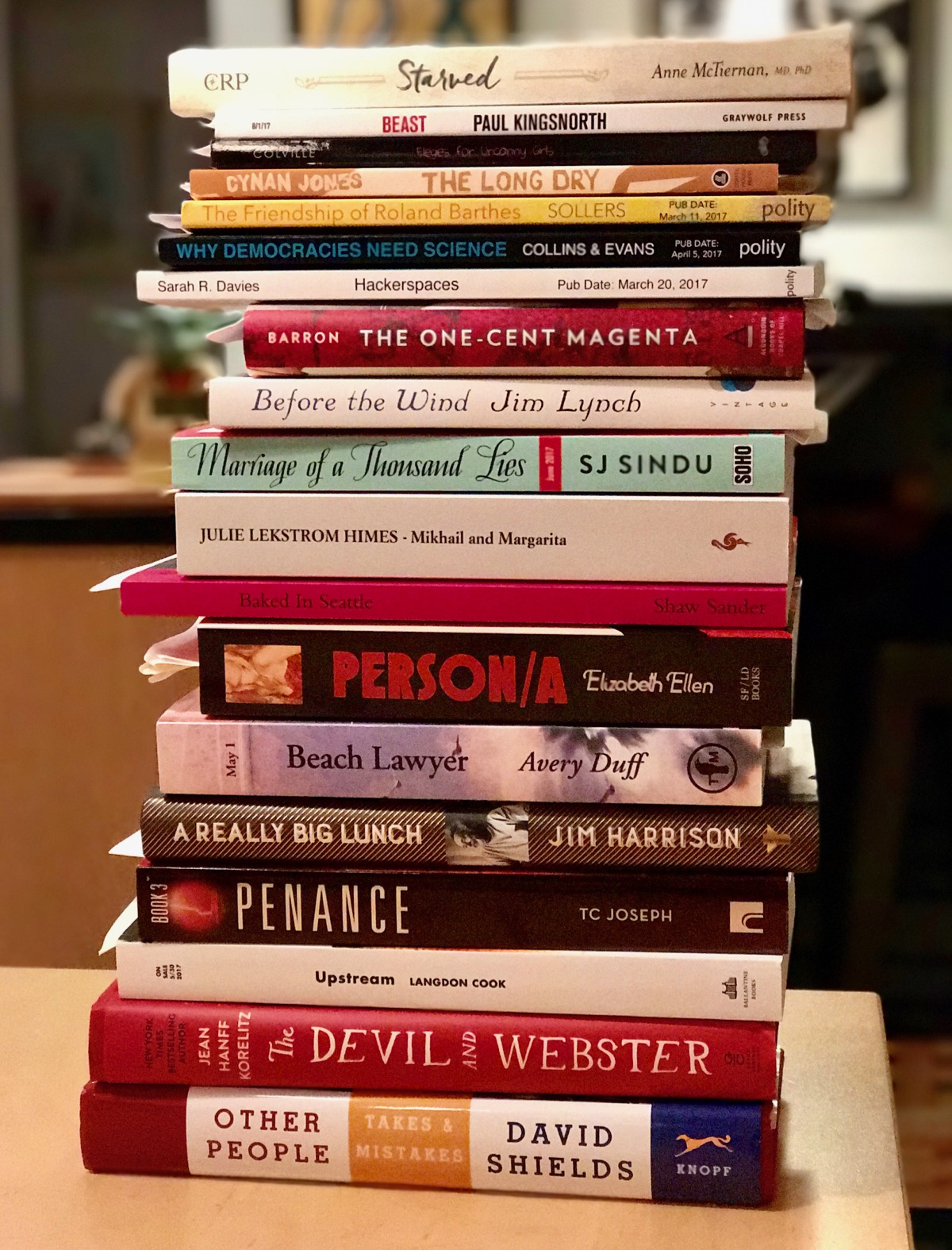Your Week in Readings: The best literary events from March 1st - March 7th
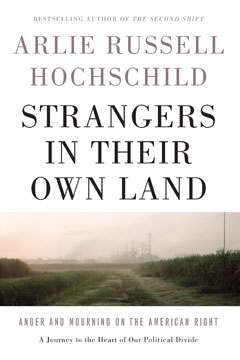
Wednesday March 1st: Reading Through It: Strangers in Their Own Land
The Seattle Review of Books and the Seattle Weekly present our monthly current-events book club. This edition focuses on Arlie Russell Hochschild’s Strangers in Their Own Land: Anger and Mourning on the American Right. Hoschchild, a sociologist from Berkeley, reports on what happened when she went to deep-red America to figure out what makes Republicans tick. Third Place Books Seward Park, 5041 Wilson Ave S, 474-2200, http://thirdplacebooks.com. Free. All ages. 7 p.m.Alternate Wednesday March 1st: Ben Fountain
Okay, so Ang Lee’s film adaptation of Ben Fountain’s novel Billy Lynn's Long Halftime Walk was a total bust. But that doesn’t detract from the book: with his debut novel, Fountain stabbed into the heart of American self-regard. Come celebrate one of the brightest young talents to appear on the scene in the past decade. Benaroya Hall, 200 University St., 215-4747, lectures.org. $2o. All ages. 7:30 p.m.Thursday March 2nd: Finding Common Ground in America
On the long list of journalists who screwed up during the 2016 presidential election, you won’t find Matt Taibbi’s name. Unlike most pundits, the Rolling Stone writer never discounted the rise of Bernie Sanders or the victory of Donald Trump. Tonight, Taibbi joins progressive activist Joel Berg in conversation. Town Hall Seattle, 1119 8th Ave., 652-4255, townhallseattle.org. $5. All ages. 7:30 p.m. PAUL CONSTANTFriday March 3rd: First Second Comics Panel
See our Event of the Week column for more details. Seattle Public Library, 1000 4th Ave., 386-4636, spl.org. Free. All ages. 7 p.m.Saturday March 4th: Saturday on Mars!
Seattle author Kevin Emerson launches (haw-haw) his new sci-fi middle-reader novel Last Day on Mars, about a young man who lives on Mars after the destruction of Earth. The Bureau of Fearless Ideas celebrates with a fun party including a reading, cake, science experiments, and readings from young BFI writers. Bureau of Fearless Ideas, 8414 Greenwood Ave N., 725-2625, http://fearlessideas.org. All ages. 1 p.m.
Sunday March 5th: Words from the Cafe
Washington state’s poet laureate, Tod Marshall, helps celebrate a new book/cd compilation from local publisher Raven Chronicles Press. Edited by Anna Balint, Words from the Café allows Seattleites suffering from addiction, mental illness, and/or homelessness tell their own stories in their own words. Elliott Bay Book Company, 1521 10th Ave, 624-6600, elliottbaybook.com . Free. All ages. 2 p.m.Monday March 6th: Paul Havas Reading
Art critic Matthew Kangas’s newest book, Paul Havas, focuses on the life, letters, and work of an underrated Seattle-area artist Paul Havas. Havas focused primarily on rural landscapes that were unmistakably Northwestern: gray skies over lush landscapes, mountains, calm waters reflecting tranquil scenes. Come learn about an important figure in the Northwest art tradition. University Book Store, 4326 University Way N.E., 634-3400, http://www2.bookstore.washington.edu/. Free. All ages. 7 p.m.Tuesday March 7th: Artificial Emotional Intelligence
Richard Yonck has done a lot of thinking about what will happen when our machines think faster and more deeply than we do. His latest book, Heart of the Machine: Our Future in a World of Artificial Emotional Intelligence, investigates what might happen when we get out-thought by our own creations. Town Hall Seattle, 1119 8th Ave., 652-4255, townhallseattle.org. $5. All ages. 7:30 p.m.We told you last night that the bidding war for memoirs from Barack and Michelle Obama reached $60 million. Last night, Penguin Random House announced that they won the rights to publish the books. They're expected to arrive in 2018. Penguin Random House's CEO promises to "make each of their books global publishing events of unprecedented scope and significance."
Literary Event of the Week: First Second at Seattle Public Library
With Emerald City Comicon landing at the Convention Center, all of Seattle is suffering from a ferocious case of nerd fever this weekend. But if you can’t make it to the show, you shouldn’t feel as though you’re missing out on the fun. In fact, the after-parties and side events — all of which are open to the public, even those who don’t have an ECCC lanyard — look to be more exciting than the main event.
First of all, if you haven’t visited Seattle’s newest comic book store, Outsider Comics & Geek Boutique, you should stop by for a visit on Saturday night, when the Seattle Video Game Orchestra and Choir will give a free, all-ages concert of some of your favorite video game standards from 8 to 9 pm. Outsider Comics will be hosting a full complement of comics creators all week long, from Fraggle Rock artist Jeff Stokley to O Human Star cartoonist Blue Delliquanti. Visit their Facebook page for more details. Capitol Hill’s Phoenix Comics is hosting several events, including Seattle writer G. Willow Wilson signing books with artists Gene Ha and Babs Tarr on Friday night at 7 pm.
If you’re looking for less fuss and more commerce, Wallingford’s Comics Dungeon, which recently announced it was becoming home to a comics literacy organization named Comics for Community, Compassion and Culture, will be hosting one of their trademark huge sales, with proceeds going toward the new nonprofit’s worthy mandate to introduce more comics into libraries and schools.

But the whole point of a convention is to get out in the world, to see people and to be seen. And if that’s your goal, the Seattle Public Library downtown is hosting maybe the best ECCC-related event on Friday March 3 at 7 pm. It’s a celebration of one of the most underrated comics publishers in the United States, First Second — a New York-based publisher of (mostly) all-ages books that serve as marvelous entryways into the world of comics. First Second’s books are beautiful, with high production values and a wide array of nontraditional subjects that effortlessly draw in comics noobs.
This promises to be a fun and freewheeling night at the library: First Second cartoonists Gene Luen Yang, Box Brown, Penelope Bagieu, and Matthew Loux will take part in a panel discussion, book signing, and what can only promise to be a truly epic game of Pictionary. Loux’s brand-new book, The Time Museum, is about a young woman who takes on an internship at a time-traveling museum powered by a gigantic brain named Gregory. French cartoonist Bagieu’s comics biography of Mama Cass, California Dreamin’, will be published this month. And Brown’s biography of Andre the Giant documents the world-famous wrestler’s bizarre beginnings — Samuel Beckett used to drive the young Andre to school — and his star-studded, tragically short life.
The biggest cartoonist on the bill, of course, is Yang, whose book about race and identity, American Born Chinese is one of the best comic books — or, okay, graphic novel, if you’re snooty — of the new millennium. As an advocate of youth comics initiatives worldwide, Yang will likely serve as the (absurdly young) elder statesman of the batch, introducing the bold new cartoonists to an eager audience. And really, isn’t that what comics conventions are supposed to be all about?
A good deal on sponsorships
We've got two open sponsorships in March we'd love to get into your hands. We've discounted them — $50 off for next week, March 6 - March 12, and $25 off for the week after, March 13 - March 19. Grab 'em quick!
We're also in super-secret testing with some new sponsorship types. Besides events and books, we'd love to promote opportunities for writers (contests, call-for-entries, retreats, and anything else), and charitable giving. If you'd like to try either of those, we'd love to hear from you. These discounted weeks might be a good low-risk way to try us out. Send us an email if you have any questions or want to talk more.
The Hill reports:
A bidding war over the global rights to two books from former President Obama and his wife Michelle has soared above $60 million, according to a new report.
Pay them the damn money! I can't wait to read these books.
John Williams at the New York Times writes:
Patti Hartigan, a former theater critic for the Boston Globe, has been signed to write the first major biography of August Wilson, the two-time Pulitzer Prize-winning playwright and one of the most significant voices in 20th-century American literature. 37 INK, an imprint at Atria Books, plans to publish the book, tentatively titled “August Wilson: The Kiln in Which He Was Fired,” in late 2019.
Wilson's papers are here in Seattle, the city the playwright adopted late in his career. This is big news for our corner of the world, of course. Wilson is one of the best writers ever to make Seattle his home, and Dawn Davis, the book's editor, has been out to Seattle many times. Though Wilson's magnificent Pittsburgh Cycle obviously centered around a different American city, Seattle is an integral part of his personal story.
Writer cancels Emerald City Comicon appearance over Trump's policies
Australian comic and TV writer Tom Taylor announced last night on Facebook that he's not going to attend Emerald City Comicon this week in Seattle. In fact, he's not coming to the United States at all this year. Why? Well, I'll let him speak for himself:
...America, through no fault of most of its citizens, doesn’t feel like a safe or welcoming travel destination at this moment.
There have been reports of interrogation, phone data downloads, requests for social media accounts, returns and five-year travel bans and everyone from children to the elderly being detained. All of this has many people I’ve spoken to reconsidering or cancelling their US travel plans.
I’ve had friends and people I work with suggest I leave my phone at home, or delete my twitter account for a month before I come.
I refuse those terms.
This is bad news for Seattle comics fans, but Taylor is doing the right thing here by making his decision public. Remember when Mike Pence promoted a batshit anti-LGBT law in Indiana and then businesses and performers announced that they were boycotting Indiana? Remember how Pence backed down? Boycotts might suck for fans, but sometimes boycotts work.
I'd advise comics fans to get used to this kind of post; I bet we'll be seeing more of them in the months and years to come.
Amen / Amen
"Emancipate us from mental slavery..."
— Bob Marley (Redemtion Song)The Discovery of America by Christopher Columbus
You
Salvador Dali
see our history's golden man
Christopher Columbus
in your Andalusia way
as robust young boy
perhaps teenaged
as one who pulls his big bellied ship
toward us from ocean's edge
masts banners swords clouds
crucifixes shadows sails
monks trapeze artistsYour
huge canvas wall-sized
brings home to Florida
in this museum created
in your name for you
the wishes of those monarchs
the youngish Ferdinand
his lovely Isabella
your own country
the infant SpainHe
Columbus not old
enough to shave
barefoot and shirtless
not yet Great Admiral
of the Ocean
now drags ashore
the Old World's wettest dreams
of church
of colony
of empire
that bid us marvel
at our own demiseBlue Note Belly Blues — A Call and Response Poem
You came
halfway
round
the world
in the belly
of a ship
in the belly
of a slave
in the belly
of the oceanThink About It
in the belly
of a drum
in the belly
of a calabash
in the belly
of a dance
in the belly
of a shout
bathed in
palm oilThink About It
in the belly
of a shuffle
in the belly
of a moan
in the belly
of a grin
in the belly
of a stormThink About It
in the belly
of a savanna
in the belly
of the wind
in the belly
of the tidesThink About It
Say Baby
let's you & me
bust free
ride
this blue blue note
into Freedom's bellyThink About It
This blue note
North Star
gotta get outah here blue note
this Black Bottom blue note
this moaning low speaking low
blue note
this jazz back juke joint
saxophone blue noteThink About It
This high stepping 2nd line
blue blue blue note
this high flying Take me
to the Moon
blue noteThink About It
This Baby Baby Baby
what have I done
to be so black & blue
blue blue note
let's kick back
three ways to Sunday
blue note
blue note
blue noteThink About It
Baby
let's turn ourselves inside out
ride Freedom's blue
blue note
and fly away
fly away BabyThink About It
Think About ItAncestors
She drew her first basket
on its side she made a mask
w/ eyes and nose
on its top she made a mouth
slightly open
she thoughtShe invited some friends
to see the basketInside its curved belly
they saw
a flag w/ zebra marks
the curved teeth of a lion
gold elegant huge
rows of elephant tusks
a crocodile nappingThey heard a spirit voice
calling all their namesThey struggled to breathe
they tried to speak
they wanted to dance(for Nisi)
Lunch Date: America's worsening political divide, with a side of corned beef
Once in a while, I take a new book with me to lunch and give it a half an hour or so to grab my attention. Lunch Date is my judgment on that speed-dating experience.
Who’s your date today? Arlie Russell Hochschild's Strangers in Their Own Land: Anger and Mourning on the American Right: A Journey to the Heart of Our Political Divide. This is the book we'll be discussing at our monthly Reading Through It Book Club at Seward Park Third Place Books this Wednesday. (It's free! Buy a drink in the bar and join us at 7 pm!)
Where’d you go? I visited Mean Sandwich, a new restaurant in Ballard. My friend Bethany Jean Clement's profile in the Seattle Times made it sound too delicious to pass up.
What’d you eat? I had the Mean Sandwich, which is corned beef, mustard, and cabbage on a roll.
How was the food? Oh my God. I take my sandwiches seriously, so I do not say this lightly: Mean Sandwich is one of Seattle's best sandwich places. Take a look at this:

I've never had a sandwich with giant cubes of corned beef like this, and in the wrong hands this kind of thing could be inedible. Instead, it was light and sunny. The beef wasn't too fatty or too watery, the cabbage was vinegary, and the maple syrup and sprigs of mint made everything taste fresher and more complex.
If I had to come up with one complaint, it would be that there as a little too much of the yellow mustard — and I say this as someone who loves mustard on a sandwich. But every ingredient on this sandwich was optimized to perfection. And you can tell someone knows their business when a sandwich doesn't fall apart while you're eating it. I've had plenty of corned beef sandwiches wind up a mess of wet bread and meat chunks on my placemat, but the Mean Sandwich held together perfectly. It's a masterpiece of culinary engineering.
What does your date say about itself? Here's a blurb from author Mark Danner:
If the great political question of our time can be summarized in the two words, ‘Donald Trump,’ the answer is to be found in Arlie Russell Hochschild’s brilliant new book, Strangers in Their Own Land: Anger and Mourning on the American Right. Hochschild, an eminent sociologist with a novelist’s storytelling skill, has crafted an absorbing tale full of richly drawn, complicated characters who come bearing their own fascinating histories. Together, in Hochschild’s authoritative hands, they offer a compelling and lucid portrait of what had seemed a bewildering political moment. A powerful, imaginative, necessary book, arriving not a moment too soon
(And, yes, I'm aware of the irony of a "coastal elite" taking a book to a restaurant with a $12 sandwich in a city that chose to raise its minimum wage to $15 an hour. The irony, in this case, is quite literally delicious.)
Is there a representative quote?
In the life of one man, Lee Sherman, I saw reflected both sides of the Great Paradox — the need for help and a principled refusal of it. As a victim of toxic exposure himself, a participant in polluting public waters, hating pollution, now proudly declaring himself as an environmentalist, why was he throwing in his lot with the anti-environmental Tea Party? Not because the Koch brothers were paying him to, at least directly. Lee was putting up Tea Party lawn signs for free. Still, his source of news was limited to Fox News and videos and blogs exchanged by right-wing friends, which placed him in an echo chamber of doubt about the EPA, the federal government, the president, and taxes.
Will you two end up in bed together? Well, obviously. I have to finish reading it by the book club on Wednesday!
But even if it wasn't homework, I'd definitely want to read more of this book. Hochschild is a gifted literary portraitist, and I like how aware she is of her own thesis throughout the book. My one concern with the early part of the book that I've read is that I hope Hochschild doesn't just offer one anecdote after another. I hope she widens her angle, looks at the data, and actually builds to a thesis about what happened and what we should do to end the divide. By Wednesday, I'll find out if my hopes for the book were fulfilled.
Chatting with February Poet in Residence JT Stewart about her history and her work
JT Stewart is our February Poet in Residence. We've run three sets of poems by her: "Invocation", "FOLKS: 'Many Rivers to Cross'", and "SISTAHS — How We Got Ovah". Check back tomorrow for the last set in this series.
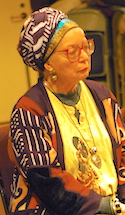
You may not know JT Stewart's name, but if you're involved in the literary arts in Seattle, you've come across her influence. She's woven into this city, threads in the plaits of literary culture, as a poet, writer, playwright, editor, teacher, performance artist and more. She's taught students at the University of Washington, Fairhaven College at WWU, and Seattle Central Community College (including yours truly), where she was the executive editor of the annual student-run literary journal Ark — a journal run on blind submissions back before such was fashionable. She's been a curator of the Jack Straw Writers Program, a board member at Hedgebrook (where there is a distinguished writer's scholarship in her name), a judge for the Governor's award and King County's Poetry on Busses, and is one of the founders of the Clarion West Science Fiction Writer's Workshop.
Stewart is a striking woman, tall and elegant, with a thoughtful, sometimes whimsical, approach to students and teaching, and a probing approach to art. Identity seems to be one of her biggest themes: her identity as a black woman with strong African influence is foundational for much of her art. I asked about her use of identity: "perhaps the best working description is 'border crossing poetry', so thank you to Rose Lemberg for helping me plus teaching me to truly understand my work." She also said that poetry has given her the kind of flexibility she needed for the "tangled complex issues of being or becoming any of the following: a woman writer, an African-American writer, a black writer, a feminist writer, a multicultural writer."
She learned her craft from musicians and artists, and considers her work performative: "I consider myself 'a voice artist'," as she puts it.
Stewart is perhaps best known as a poet and prose writer. "I use poetry (primarily non-linear) to free myself from the shapes of prose w/ its sentences, its Aristotle based logic / its punctuation rules, its grammars. With this freedom I can create / explore imagined worlds." Prose she sees as a more formal way of expressing herself, through academic papers, discussions, and letters, recalling a satisfying response to delivering a paper on Huck Finn at the Georgetown Law School.
She was a regular book reviewer for the Seattle Times during the 1980s, where she was tasked with covering books by black writers. Of the many she wrote, she says her 1987 review of Toni Morrison's Beloved stands tall in her memory.
She grew up in New York, attending the High School of the Performing Arts (when it was called the High School of Music & Art). As an undergraduate at the historically black Fisk University, Stewart studied with United States Poet Laureate (at the time he served, the role was called "Consultant in Poetry to the Library of Congress") Robert Hayden. He "introduced me to a galaxy of black history and writers" says Stewart. Graduate school took her to Wellesley, and then Fordham University in the Bronx, where she studied under her mentor Professor Charles Bernardin "who introduced me to visionary poets like William Blake, Samuel Taylor Coleridge, and playwrights like the obscure (but once popular) Reverend William Mason."
"From this rigorous scholarship. I've learned to love history - also writers who use history in their work - e.g. August Wilson and Octavia Butler. (See my poems from week one 'Invocation,' and week three 'Sunday Morning'.)
"A lot of my poetry is based on historical research. Thus I can say my poems have kissing kin relationships with history (some times real — some times imagined). And these poems usually take years to compose."
Once in Seattle, Stewart was an attendee at the 1973 Clarion West Workshop, the acclaimed intensive six-week Science Fiction and Fantasy program founded by Vonda N. McIntyre, based on the Clarion Workshop. That year, she studied with Harlan Ellison and Ursula K. Le Guin, among others, in what ended up being the last year of that iteration of the workshop.
Stewart and Marilyn J Holt were running the Science Fiction Fair in the late seventies and early eighties. Since she was teaching at Seattle Central Community College at that time, she saw the opportunity, and approached the VP of instruction and convinced him that restarting Clarion West at the school would be a smart move. Stewart, Holt, and McIntyre rebooted the workshop in 1984, setting it up as a non-profit, and it's been running continuously ever since.
About her work as a playwright, Stewart says: "I've also spent considerable time working as a playwright here in Seattle with three theaters that have shut their doors: the Alice B Theater / the Empty Space Theater / the New City Theater. My teachers included my Director Susan Finque and the Artistic Directors: Ricky Rankin, Kurt Beattie, John Kazanjian. Also I studied with two influential women of color playwrights: Cuban-American Maria Irene Fornas and African-American Pulitizer Prize Winner Susan Lori-Parks."
What's next? "I've published two short stories and have had folks tell me they are parts of a novel. Perhaps that's waiting in the wings. And - yes - I now know how it will end."
We'd like to thank Stewart for working with us, and bringing her work to our readers. We will note that we normally refuse to defer payment to poets, but at her request, we donated Stewart's payment to Hugo House, where she has taught, in her name.
The Sunday Post for February 26, 2017
Each week, the Sunday Post highlights a few articles good for slow consumption over a cup of coffee (or tea, if that's your pleasure). Settle in for a while; we saved you a seat.
4chan: The Skeleton Key to the Rise of Trump
Two good ones this week on a particular alt-right (or whatever) subculture:
Laurie Penny has spent solid time with Milo Yiannopoulis and his young male entourage, and her account from the tour bus during the Berkeley riot is mesmerizing and exceptionally well written. Make sure to pair it, though, with this counter by Aura Bogado, on what happens when you code white privilege as innocence.
In a similar spirit (if you’re not sure what that spirit is, go read Graham Greene’s “The Destructors”): Dale Beran’s piece on 4Chan, the online forum that birthed Gamergate, and how it grew from a few kids who liked anime to a worldwide collective with the power to change our country’s future.
Trump supporters voted for the con-man, the labyrinth with no center, because the labyrinth with no center is how they feel, how they feel the world works around them. A labyrinth with no center is a perfect description of their mother’s basement with a terminal to an endless array of escapist fantasy worlds.
Trump’s bizarre, inconstant, incompetent, embarrassing, ridiculous behavior — what the left (naturally) perceives as his weaknesses — are to his supporters his strengths.
Code Rouge: Cracking the Case of the Counterfeit Makeup
Simple to make, lightweight to ship, and a breeze to unload over EBay and Alibaba, counterfeit makeup is easy money. David Gauvey Herbert follows “Operation Big MAC,” a DEA-led initiative to take down cosmetic companies’ biggest enemy: the multitude of small-time sellers that are costing name brands billions every year. A crazy mix of high drama and petty theft, and maybe just a touch of schadenfreude for the original flim-flam industry ($20 for a tube of lipstick? how’d you talk us into that?).
Greenberg and rookie inspector MacDonald initiated surveillance on the family’s home. For months, two to four vehicles at a time would park nearby, watching business associates pick up inventory. Agents also tailed the couple as they drove around town. They went to school, the gym, and restaurants, but never seemed to hold 9-to-5 jobs. And yet over four years, investigators tallied $629,000 in cash deposits to the couple’s bank account, plus an additional $100,000 in Amazon sales.
Harold Denton, nuclear regulator who calmed fears at Three Mile Island, dies at 80
Harold Denton was an archetypal American hero — cool under pressure, fearless when the chips are down — whose country called him to meet an equally archetypal crisis: a nuclear emergency on Three Mile Island. Do right, save the world. The Washington Post revisits his story.
News reports speculated on several apocalyptic scenarios, including the possibility that an explosion could rip through concrete walls four feet thick. The most serious risk was a meltdown, in which the reactor’s superheated core could burn through the building’s base and burrow into the earth.
Mr. Denton was monitoring events from NRC’s headquarters, but President Jimmy Carter said a federal official should be at the scene to take charge. On March 30, two days after the initial accident, Mr. Denton flew to Three Mile Island in a White House helicopter.
He found the power plant to be in “absolute chaos,” he told The Washington Post at the time.
Complicated. Weird. Beautiful! The secret Google project to put an aquarium full of tiny, wiggly water bears inside your phone
I hadn’t thought to mourn the death of Google’s Ara, the modular phone project that closed last year, “hamstrung by time, money, and worst of all, reality” — until I read this. A phone full of water bears? Yes, ridiculous, but gloriously so. Also a very readable, very geeky inside look at the outer edge of tech innovation.
As Google neared completion of what would become a last-ditch effort at the shell for an Ara prototype, the company commissioned a team of Brooklyn engineers, designers, and artists to dream up the craziest idea imaginable and squish it down to fit inside a phone.
If you could build an entire phone out of blocks, like a high-tech Lego set, what would you create?
Seattle Writing Prompts: the PI-Building Globe
Seattle Writing Prompts are intended to spark ideas for your writing, based on locations and stories of Seattle. Write something inspired by a prompt? Send it to us! We're looking to publish writing sparked by prompts.
Also, how are we doing? Are writing prompts useful to you? Could we be doing better? Reach out if you have ideas or feedback. We'd love to hear.

This globe was first raised over their building at 6th and Wall in 1948. The Post-Intelligencer — a combined name (the Seattle Post merged with the Intelligencer in 1881) that feels like a commentary name — had its headquarters there, in a building that is now housing City University. You can still see the round entry where the globe sat before they moved it to the newer waterfront building in 1986.
The P-I was a Hearst paper. During it's long run, northwest novelists Tom Robbins and Frank Herbert were employees, as was EB White (as in Strunk-and, and Charlotte's Web) for a spell after he got fired from the Seattle Times ("A youth who persisted in rising above facts must have been a headache to a city editor" he wrote later. He also wrote, after reading his journals of his time in Seattle, "As a diarist, I was a master of suspense, leaving to the reader's imagination everything pertinent to the action of my play").
The globe is certainly an icon in this town. Any montage worth its salt is sure to show it. It currently belongs to the Museum of History and Industry, but exactly what they have planned for the big metal ball of steel and neon has not yet been revealed. But, wherever it goes, it will still inform you: "It's in the P-I".
Surely, there were thousands of stories that took place as that globe turned and the desks turned in their reporting. But let's try something different, if you're game. Let's think of a few stories that take place all within view of the PI Globe.
Today's prompts
The Jogger — Back then, going through Myrtle-Edwards at night wasn't the best idea, but a tough guy like him wasn't gonna get scared off his nightly run by some hoods in a park. But when a charley horse in his calf pulled him up short by one of the pocket beaches, he could hear the lapping of the water against the rocks and wood. And he could hear the voice coming up low and stranled, "help me, please!"
The Artist — Finally, a show in New York. Working around the clock was worth it. But the loft space that used to look at the water now looked at that damn new building for the paper. And they lowered that kitschy monstrosity on top, and lit it up, ruining the light in the studio. Nothing doing, the paintings had to get finished. Even if the seeping influence of that glowing ball found its way into them....
The Accident — It was just their luck. The road was wet, just on Elliott where it turned. The Camaro they jacked was powerful, but with bald tires. They slid, sideswiping that other car, then careening into a parked car, smashing the front-end. Now they had to choose: run for it, or stop to help the woman they just hit.
The Informant — He kept to the shadows across from the paper, up their on 6th. He risked lighting a cigarette, then cupped it in his hand so as not to draw attention to himself. That reporter knew where he was. She'd want to know all the details, and he was ready to spill. Damn the consequences. Ain't no good having connections when they all just gonna turn on you. Best thing you can do is turn on them first, and get out of town. That's just what he planned to do. He pulled his hat down to shield his eyes from the rain, and waited to for the dame to get off her duff and come find him.
the Chaplain — The bay was well protected, both by these inland waters they'd been exploring on the Wilkes Expedition — still going strong in 1841 — and by the natural land forms that curved about it. Jared Leigh Elliott, chaplain on the Vincennes, had borrowed a glass to observe the shore from the ships rail. Suddenly, he had a vision through the scope that quite shook him. A vision of a globe, lit by some ghastly ominous light, with letters surrounding, quite clearly spelling "IT'S IN". A moment later, the vision was gone, and Elliott scanned the land again, trying to find whatever it was he surely must not have seen. Wondering if he was having a fit. He heard the steps behind him, knew it was the captain come to chat. Wondered exactly if he should tell him what he had seen. A glowing world. Why would the lord visit such strange visions upon him?
A piece for the Millions titled "Against Readability" by Harvard College Writing Program professor Ben Roth has been circling the lit-o-sphere this week. It's a classic finger-wagging routine about serious literature from an establishment male:
“Readable” has become the chosen term of praise in our times precisely because so many of us find ourselves unable to concentrate as we once could or still aspire to. But to praise readability is to embrace the vicious feedback loop that our culture now finds itself in. Short on concentration, we give ourselves over to streams of content that further atrophy our reserves of attention. Soon a 1,000-word polemic seems too long to drag oneself through, and we resort to skimming. So websites post yet shorter articles, even warn you how many minutes they will take to read (rarely double digits; will they soon warn us how long one takes to skim?). Editors pre-empt their own taste, choosing not what they like, or think is actually good, but what they think they can sell. Teachers, even professors, shy away from assigning long or difficult books.
Sigh. Yes, and culture is dying and who will preserve our proud heritage and blah-blah-blah. But in the middle of trying to formulate a response, I encountered an excellent comment on Roth's own piece by commenter "Pete R," which I'll share here:
Accessibility and literary merit are independent. You could call the work of Chekhov “readable,” also Dickens, and neither should be considered inferior to Joyce. Is Dubliners inferior to Ulysses or Finnegan’s Wake?
There are so many elitists who would happily back literature into a tiny, private corner. “Make Literature Great Again” type of people. We must ignore them aggressively.
Such a great comment. Smart, to-the-point, and, yes, readable.
By now, you've undoubtedly gotten into the practice of contacting your local representatives about issues that concern you. That's great! Now, our friends at Hugo House are asking that you momentarily set aside your Trump-related concerns so you can advocate for them.
As you know, developers are right now constructing a fancy new building where Hugo House once stood, and Hugo House will have a home in that building. And the House is in the running for a state grant to pay for their new home. But that grant is not yet a sure thing. Here's where you come in. Hugo House Executive Director Tree Sweonson writes:
You can make a big difference by contacting your State legislators to let them know why you think it's important to have public support for a new and permanent home for Hugo House.
You can find a sample email and a link to a site that will tell you who represents you in the state legislator right here. If you've bemoaned the loss of important institutions during the Seattle real estate boom, this is your chance to speak out, to ensure that one piece of Seattle that's been around for decades continues to have a new life in the decades to come. Go make yourself heard.
The Help Desk: Even in an age of Trump, writers should be paid for their work
Every Friday, Cienna Madrid offers solutions to life’s most vexing literary problems. Do you need a book recommendation to send your worst cousin on her birthday? Is it okay to read erotica on public transit? Cienna can help. Send your questions to advice@seattlereviewofbooks.com.
Dear Cienna,
I’m a poet. I’ve been published here and there, in a magazine you’ve maybe read. Like most creative people, I’m pissed about Donald Trump and so I’ve written a few poems about current events. I read one at a group reading last week and I was approached after the reading by someone who’s putting together an anti-Trump anthology. The good news: he wants to include my poem!
The bad news? It doesn’t pay. Now, a portion of the proceeds are going to the ACLU and other charities, which is fine by me, of course. But it’s only a portion, which to me indicates that he’s taking some of the money for himself. I’m sick to death of people publishing my work without any compensation, and it seems like he’s exploiting the moment and the outrage to make a few bucks. It’s not really about the money, it’s the principle. Should I just politely decline, or should I raise a stink?
Nora, Auburn
Dear Nora,
Throwing oneself in front of a Arc bus seems like a slightly more effective "get rich quick" scheme than conning poets out of poetry, but I'm with you: artists should be compensated for their work. When my biological father died, I passed out candy necklaces and to-go bags of his cremains to all the eulogists. Their response to my thoughtfulness was visceral.
It's perfectly reasonable and not turdish at all to email this person and ask for a breakdown of which charities will benefit and how the proceeds will be split. Ask outright: Are you keeping any of the proceeds for yourself? From there, follow your heart – or the potato you call a heart, if you're like me. Remember: We're barely into month two of this administration. I suspect there will be plenty of time to participate in anti-Trump anthologies in the coming years.
Kisses,
Cienna
Deborah Bogle at The Advertiser reports that Australian children's book author Mem Fox was "detained for two hours and aggressively interrogated by immigration officials at Los Angeles airport."
En route to Milwaukee for a conference on February 9, where she was to deliver the opening keynote address at a literacy conference, Fox was ushered into an airport holding room and told she was travelling on the wrong visa. This was incorrect and the US Embassy in Canberra has since apologised. Fox, 70, said that by the time she checked in to her hotel she was shaking and sobbing.
“I am old and white, innocent and educated, and I speak English fluently,” she said. “Imagine what happened to the others in the room, including an old Iranian woman in her 80s, in a wheelchair."
Bogle notes that Fox has visited the US over a hundred times, but now the author says she will probably never travel here again.
Portrait Gallery: Quenton Baker
Each week, Christine Marie Larsen creates a new portrait of an author for us. Have any favorites you’d love to see immortalized? Let us know
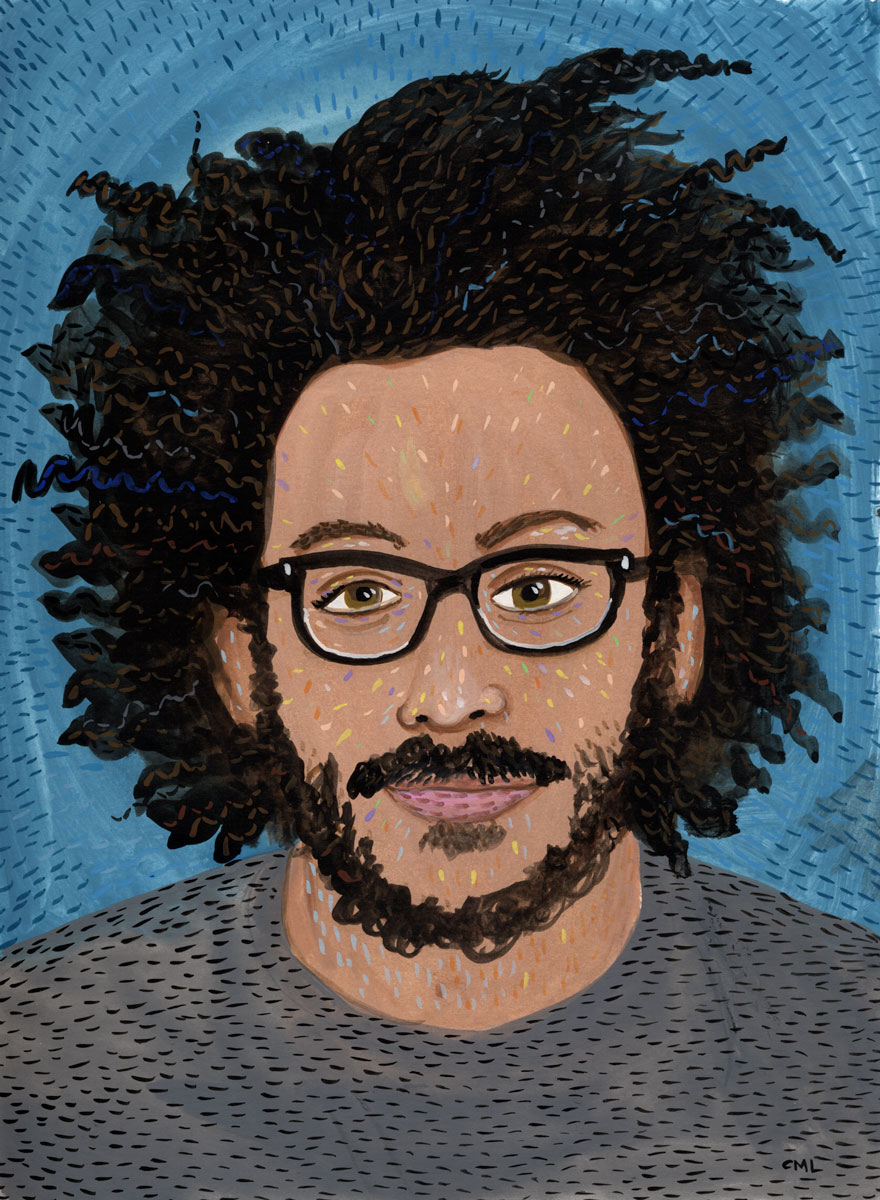
Friday, February 24th
It Was Written book launch at Vermillion
This Friday, Minor Arcana invites local poets including Robert Lashley and Brian McGuigan to help launch It Was Written with a book party at Vermillion. They’ll be joined by other readers including Quenton Baker, a poet who got his start as a hip-hop artist. Because the party would feel really weird without some form of live music, self-described “beat scientist” WD4D will be running the turntables at the show.
Vermillion Art Gallery and Bar, 1508 11th Ave., 709-9797, http://vermillionseattle.com. Free. 21+. 7 p.m.
Criminal Fiction: Scottish Noir and books galore
Every month, Daneet Steffens uncovers the latest goings on in mystery, suspense, and crime fiction. See previous columns on the Criminal Fiction archive page
This weekend sees the inaugural Granite Noir crime fiction festival in Aberdeen, Scotland (February 24 – February 26). Heavy-hitters such as Stuart MacBride, Chris Brookmyre, Doug Johnstone and Denise Mina are just some of the featured writers participating in conversations, panels, workshops, film screenings, a special Noir at the Bar and — I particularly like the sound of this one — an afternoon discussing Agatha Christie’s favorite poisons.
Granite Noir offers a distinctly Scottish crime fiction flavor, nicely infused with touches of Nordic noir. If you’re not based in the Scotland’s Granite City, you can still follow some of the fun via Facebook and Twitter
Reading around: new titles on the crime fiction scene
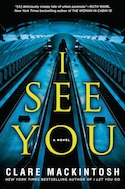
I See You by Clare Mackintosh (Berkley) whose super-chilling psychological thriller I Let You Go was one of the creepiest of last year’s creepy crop, returns with a vengeance and an on-the-pulse tale of our real-life vulnerabilities when it comes to others’ nefarious digital activities. The novel kicks off with one Zoe Walker finding her own face illustrating a classified ad for the intriguingly named “FindTheOne.com” site, and veers into the “don’t-read-this-alone-in-the-house-at-night” stratosphere from there.
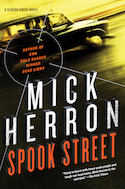
River Cartwright, a British spy based in Slough House – the dead-end office where disgraced MI5 agents are relegated to their final desk jobs – is off to visit his grandfather, former spy David Cartwright, who appears to be succumbing to old-age memory loss and ramblings. Not so reassuring for other spooks. Mick Herron’s terrific intelligence agents thriller series – this one, Spook Street (Soho), is installment number four – manages to be gritty and slick at the same time, and it’s a real pleasure to watch the super-smart if damaged Slough House agents rising to the occasion once again.
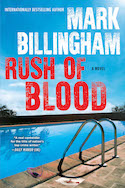
In Mark Billingham’s Rush of Blood (Atlantic), three British couples meet semi-cute on a Florida vacation, a vacay that’s marred on the last day when a young girl, unrelated to them, disappears. Back home, the six Brits stay in touch, meeting up for drinks and dinners while cops pursue the Florida mystery as well as a similar one in England. As he did in his previous standalone, 2016’s Die of Shame, Billingham does a tantalizing job of centering the smoothly paced tension around a small group of characters; and, as he did in Die of Shame, Billingham regular DI Tom Thorne makes a tiny but tenacious cameo.
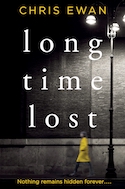
If you like your thrillers to encompass a relentless chase across Europe, then Chris Ewan’s Long Time Lost (Minotaur) is for you. Nick Miller provides a very particular kind of service, relocating people in trouble with baddies to safer spaces with new identities. But with the addition of his latest client going to ground to hide from a very dangerous man, Miller’s entire network is suddenly under threat – especially as more than one element isn’t quite what they seem to be at first glance.
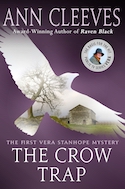
Ann Cleeves’s The Crow Trap (Minotaur) marks DI Vera Stanhope’s first appearance, back when the novel was meant to be a standalone mystery rather than the start of a series that’s going gangbusters 30 years later –not to mention being the basis of a current hit TV series. Three women gather in a small cottage in rural Northumberland to conduct an environmental survey, but it’s the pileup of dead humans that soon becomes their focus. The suspenseful story is beautifully paced and a welcome affirmation of precisely why – and how invasively – Stanhope got under Cleeves’s skin.
The Quintessential Interview: Kathleen Kent
Kathleen Kent, a bestselling historical novelist, turns her trusty pen to contemporary crime fiction in The Dime, a rollicking police procedural set in Dallas, Texas. Brooklyn transplant Betty Rhyzyk, refreshingly engaging and a committed detective with the canny voice of her tough-cop uncle a comforting – and life-saving –presence in her head, finds herself colliding with plastic-surgeried women, Mexican drug runners, Confederate re-enactors, religious fundamentalists, and, in a terrifically entertaining scene, an errant armadillo.
What or who are your top five writing inspirations?
Often, my inspiration for writing future projects will come while doing research on a current one. I’ll come across something odd or notable and it will go into my “ideas” notebook. The top five inspirational sources for writing would be newspaper articles (past or present), traveling, reading books of every genre and every possible subject, listening to music, and talking to old people. Old people have the best stories, and are usually very eager – and grateful – to talk about their lives and experiences.
Top five places to write?
My favorite place to write is at my desk, but I also relish writing in bed, on a train, on my patio when the weather is kind, and, sometimes, at a picnic table in a deserted park.
Top five favorite writers?
This is such an incredibly hard question, because there are so many wonderful writers in so many different genres, but I’ll go back to the writers that I’ve read more than once: Cormac McCarthy (Americana/Western), James Lee Burke (Crime), John le Carré (Spy/Mystery), Erik Larson (Non-fiction) — and now I’m going to cheat here because: Harper Lee, Toni Morrison, Margaret Atwood, Annie Proulx, Alice Walker, Barbara Kingsolver and many more….
Top five tunes to write to?
Music is very inspirational to me for setting the mood and narrative voice. While I wrote my first two novels, set in 17th century New England (The Heretic’s Daughter and The Traitor’s Wife), I listened to a lot of Celtic and Ye Olde English music, played on primitive instruments. My third novel was set in 1870 Texas, so I listened to Americana folk/country music, which, interestingly, has a strong Celtic influence as well. For The Dime, I made several playlists to inspire the action. My top five songs from the playlists are Bang, Bang, Bang by Dorothy; Back in Black by Brother Strut, featuring Lorna Fothergill; Conman Coming by Monica Heldal; Glory Box by Portishead; and Bad Things by Emilie Bouchereau.
Top five hometown spots?
Deep Ellum, for its restaurants and music clubs; the Bishop Arts District, for its home-grown craft stores, art galleries and indie bookstore, The Wild Detectives; Addison, north of central Dallas, for its fantastic assortment of Asian restaurants; Klyde Warren Park, for its public green areas, and nearby Dallas Museum of Art and the Nasher Sculpture Center; Trinity Groves, for its long pedestrian bridge crossing the Trinity River, walking trails and spectacular view of the Margaret Hunt Hill Bridge.
